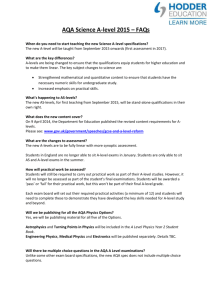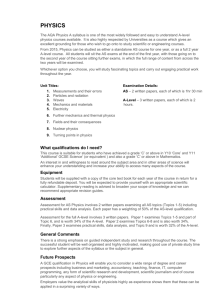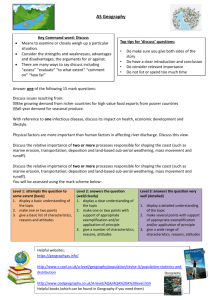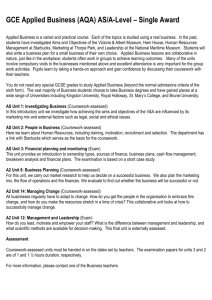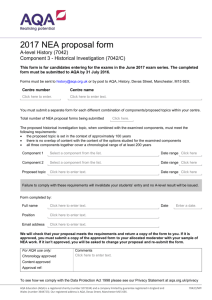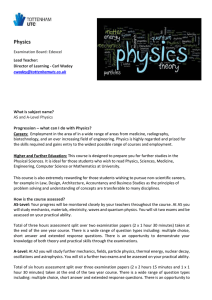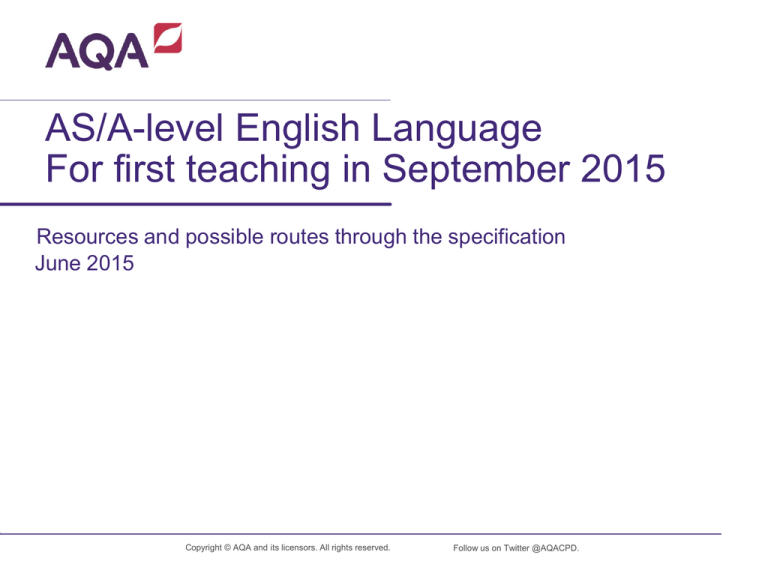
AS/A-level English Language
For first teaching in September 2015
Resources and possible routes through the specification
June 2015
Copyright © AQA and its licensors. All rights reserved.
Follow us on Twitter @AQACPD.
AQA Resources for AS and A-level English Language
• Resources available to all schools and colleges on our website:
• Specimen papers and mark schemes
• Frequently asked questions
• Guidance on co-teaching
• Summary of changes – AS
• Summary of changes – A-level
• A possible route through A-level: Linear
• A possible route through AS and A-level: Co-teaching
• Glossary of key terms and guide to methods of language analysis
(sample)
• Student responses and examiner commentaries (sample)
AQA Resources for AS and A-level English Language
• Additional resources available to schools and colleges who have
committed to teach with AQA:
• Student responses and examiner commentaries (full versions)
• Example scheme of work – AS and A-level (co-teachable)
• Example scheme of work – 2 year A-level (no AS)
• Glossary of key terms and guide to methods of language analysis (full
version)
• Possible texts to help prepare for A-level Paper 1 Section A
• Recommended reading list
Copyright © AQA and its licensors. All rights reserved.
Follow us on Twitter @AQACPD.
Student responses and examiner commentaries
• This resource gives examples of marked student responses to questions
from our A-level English Language specimen materials, with
accompanying examiner commentaries illustrating why responses have
been placed within particular levels of the mark scheme
• We have responses and commentaries for every question in the A-level
Paper 1 specimen paper, and every question in the A-level Paper 2
specimen paper
• AS student responses and commentaries will follow soon
• The full resource is available to schools and colleges who have committed
to teach with AQA, and a sample of this resource is accessible to
everyone on our website
Copyright © AQA and its licensors. All rights reserved.
Follow us on Twitter @AQACPD.
Student responses and examiner commentaries
Copyright © AQA and its licensors. All rights reserved.
Follow us on Twitter @AQACPD.
Glossary of key terms and guide to methods of language analysis
• This resource offers guidance on content that students might typically
explore when working with the different levels of language analysis on the
AS and A-level English Language specifications, as well as providing
definitions of some key terms.
• It is designed to support teachers and students in providing examples of
subject concepts and content for the new specifications.
• It does not provide an exhaustive list of concepts and terms that could be
studied and there are clearly other areas of learning that teachers can
share with their students.
• Equally, it is not simply a list of terms that need to be learnt; teachers are
encouraged to use these with their students as they feel is appropriate.
• The full resource is available to schools and colleges who have committed
to teach with AQA, and a sample of this resource is accessible to
everyone on our website.
Copyright © AQA and its licensors. All rights reserved.
Follow us on Twitter @AQACPD.
Glossary of key terms and guide to methods of language analysis
Copyright © AQA and its licensors. All rights reserved.
Follow us on Twitter @AQACPD.
Possible texts to help prepare for A-level Paper 1 Section A
• This resource includes two texts collected by a teacher to help prepare for
A-level Paper 1 Section A
• Teachers are encouraged to consider what text they might substitute for
Text B in order to make it suitable for AS Paper 1
• This resource is available to schools and colleges who have committed to
teach with AQA.
Copyright © AQA and its licensors. All rights reserved.
Follow us on Twitter @AQACPD.
Possible texts to help prepare for A-level Paper 1 Section A
Copyright © AQA and its licensors. All rights reserved.
Follow us on Twitter @AQACPD.
Example schemes of work (linear and co-teachable)
• We have made available two different example schemes of work, one of
which is designed for two teachers across a two year AS and A-level
course (with AS assessment at the end of the first year), and the other of
which is designed for two teachers across a two year A-level course
(without AS assessment in the first year).
• These schemes of work are designed so that teachers can use them for
ideas and a springboard, or criticise or reject as suits their own plans or
contexts
• They each represent one possible way in which the AS and/or A-level may
be taught. The skills and activities are only examples of the kinds of work
and approaches that teachers might like to carry out for some of these
topics and components, so are not exhaustive or prescriptive.
• The full resource is available to schools and colleges who have committed
to teach with AQA. The separate A possible route through A-level: Linear
and A possible route through AS and A-level: Co-teaching resources are
accessible to all on our website.
Copyright © AQA and its licensors. All rights reserved.
Follow us on Twitter @AQACPD.
Example schemes of work (linear and co-teachable)
Copyright © AQA and its licensors. All rights reserved.
Follow us on Twitter @AQACPD.
Possible routes through the new AS and A-level specifications
• As illustrated by the example schemes of work, whether you are teaching
the AS specification, A-level specification or both, the new AS and A-levels
bring a wide range of possibilities in terms of teaching structure
• Our AS and A-level English Language specifications have been designed
to be co-teachable, so that the content for the AS can also form the first
year of a two year A-level (as illustrated by our example co-teachable
scheme of work)
• With the two year linear A-level, you have further flexibility to teach topics
in the order which you feel is best suited to you and your students (as
illustrated by our example linear scheme of work)
Copyright © AQA and its licensors. All rights reserved.
Follow us on Twitter @AQACPD.
Thank you
Follow us on Twitter @AQACPD.

